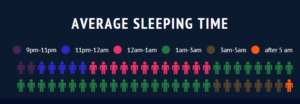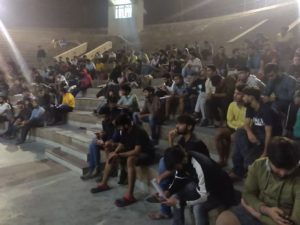IIT-K is one of the most prestigious institutes in the country. It has an excellent academic reputation, several unique facilities for research and world-class faculty. It has a vast alumni network and close to 100% placements are reported every year. And yet, it is a matter of concern that in the QS Graduate Employability Rankings of 2020, IIT-K was ranked 9th among Indian universities, behind other IITs like IIT-B, IIT-D, IIT-M, IIT-KGP and institutes such as IISC Bangalore, BITS-Pilani, University of Mumbai and University of Delhi.
The QS Graduate Employability Rankings have been designed to compare universities around the world in terms of the future prospects and career options they offer to their graduate students. They are a metric to help compare the employability of graduating students. While QS rankings for Indian institutes have always been under the scanner, they are one of the strongest metrics available out there, especially when it comes to global reputation.
[infogram id=”dashboard-red-1hke60epv70w45r?live”]
How Are The Rankings Calculated?
The rankings are computed on the basis of a score that is assigned to each university on the basis of certain parameters. These parameters include Employer Reputation, Alumni Outcomes, Partnerships with Employers Per Faculty, Employer/Student Connections and Graduate Employment Rate. These indicators have different weights towards calculating the final score of the university.
1.Employer Reputation (30%): This indicator is based on the QS Employer Survey which asks over 45000 employers to identify which institute’s graduates they find to be most competent and resourceful.
2.Alumni Outcomes (25%): This metric analyses which universities have produced various high achievers in different fields.
3.Partnerships with Employer Per Faculty (25%): This indicator assesses which institutes are collaborating with global companies around the world to produce impactful and pioneering research. It also looks at the placement related partnerships of institutes.
4.Employer Student Connections (10%): It assesses the active presence of companies in the form of career fairs, career presentations in the university over a period of twelve months.
5.Graduate Employment Rate (10%): It estimates the proportion of graduates who are able to obtain employment within twelve months of leaving the institute excluding the students who pursue further studies.
What does the SPO think?
Vox interviewed the SPO Chairman, Prof Kantesh Balani, to know about their views on the issue. According to him, ‘The QS Graduate Employability Rankings are a global index. Most probably, we fall behind in the Employer Reputation parameter due to the lack of international offers received by IIT-K students, unlike IIT-B and IIT-D students.‘
IIT Kanpur was ranked 5th in Employer Reputation, behind IIT-B, IIT-D, IIT M, University of Delhi and IIT KGP respectively, implying that we scored the worst among all the IITs that made it into top 10. The Chairman’s responded to this by saying that there have been no reports that claim that students lack technical acumen, ‘However, it is true that a few years back we received reports saying students are comparatively less prepared for interviews, especially for HR. We have taken steps to improve the situation. The new Career Development Cell has taken many sessions to improve the same.’
IIT-K has the lowest score among the top five IITs in the Alumni Reputation Metric suggesting that IIT-K has statistically failed to produce high achieving alumni in recent years. Commenting on this situation, he admitted that IIT-K has produced lesser startups than other IITs. However, facilities like Deferred Placements and Startup Incubation and Innovation Centre are working in this direction. He believes that research at IIT-K is at par with international standards. However, more publicity needs to be given to change the recent negative perceptions about IIT-K.
He remarked that being at the top for many years, the need to publicize research output never felt necessary. ‘But when we started sliding downwards, we realized that consistent efforts are needed to redeem the public perception of IIT-K, especially in India.’ He stressed on the fact that the reputation outside India was still intact, and improvements are only required within India.
Are they really reliable?
Like any global ranking system, QS also has its shortcomings. One can easily notice the missing cells in the data provided. For IIT Kanpur, only Alumni Outcomes and Employer Reputation have real values. While all the other cells stand blank. Similarly, only IIT M scores a perfect 100 in the Graduate Employment rate while other institutes don’t have any data against them. QS argues that it only gives numerical data for top 400 performers in a given indicator, and avoids releasing the values for the rest. Although they account for the real numbers while calculating the rankings, but a lack of transparency does exist.
Also, Alumni Outcomes is an indicator that gives undue advantages to Universities over IITs as the former have a large diverse multi-disciplinary student base, as compared to IITs where most of the students major in engineering. For example, Alumni excellence in non-technical fields like psychology or philosophy is easily achievable for universities like DU and the University of Mumbai. With that said, credible or not, they are one of the largest ranking databases in the world, and underperformance in these rankings does hurt the reputation of IIT Kanpur as an institute, and the right moves to tackle this are expected from both administration and students.
Poor Rankings and not being conferred as an Institute of Eminence (IoE), have garnered a lot of attention from the IIT Kanpur community. This is only one of the many articles we plan to release on our reputation, outreach, and related effects, so stay tuned.
Credits: Aayush Priyadarshi, Mrigya Gupta, Sandipan Mitra
Edited by; Pulkit Deshmukh










